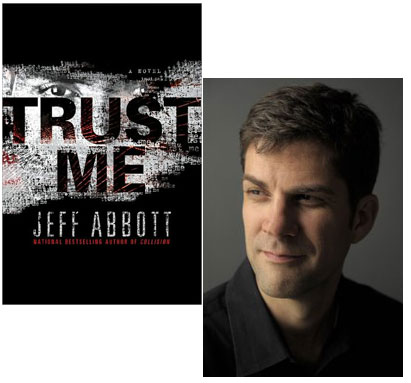Rob Holub: “The Song Is You”
Here’s a video of Rob Holub singing “The Song Is You” at Tuesday night’s Megan Abbott/Arthur Phillips reading, which raised nearly $400 in donations for Union Settlement.
In addition to readings from Megan and Arthur, the event also featured a short talk by jazz historian Will Friedwald, who explained the significance of “The Song Is You” in 20th-century American music, like why it was embraced by bebop pioneers and Frank Sinatra a decade after it was first introduced to the public. Rob also sang one of his original compositions; New Yorkers will be able to see him at the Rockwood Music Hall on August 22.
31 July 2009 | events |
Jeff Abbott: A New Kind of Profiler

I’ve been on the Internet for 17 years now, so I know from experience—there’s a lot of disturbed people online. Today they write resentment-filled blogs, leave hateful comments on other people’s posts, or pick fights with each other on discussion forums, but I can remember when they used to hang out on Usenet newsgroups, ready to remind you over and over again of their moral and intellectual superiority to the rest of humanity. (Hell, I can remember too many occasions when I confused being a deliberately hurtful asshole with speaking truth to power.) For the most part, though, the Internet’s anklebiters, from the failed litterateurs to the most rabid political guttersnipers, are harmless; they’ll try to cut you down, and do their best to make you feel as small and impotent as they do—they congratulate themselves when they can get you to actually respond to their garbage—but unless you’re dealing with a real nutcase, they aren’t going to reach out and try to mess with your life.
But what if they did? What if, instead of expending all his energy ranting online about how this nation has sunk into degeneracy, one of these guys took the next step and started living the revolution instead of just basking in the aura? Jeff Abbott’s new novel, Trust Me, explores that scenario—how would these guys get driven to the tipping point, and what could we do to stop it? Heck, how would we see it coming?
My original thought in writing Trust Me was to write about a young man whose life had been derailed by a random act of violence, and who desperately wanted an answer to the unanswerable: why do people commit evil acts?
Ever since The Silence of the Lambs, audiences love to parse the psychology of evil. Popular culture has been full of criminal profilers: those practitioners who can look at a crime scene and deduce much of the killer’s mental makeup.
But I didn’t want to tread on well-worn ground. I wondered, where are the profilers of extremists? Someone with an extreme ideology and a bomb or a homegrown chemical lab can kill more people than a knife-wielding serial killer. How do we find and stop the next Timothy McVeigh, or the next Unabomber, or the next anthrax mailer? How do we find the next young American who decides to go to Somalia and fight for extremist groups—and perhaps return with a heart filled with hate? How do we find ways to make suicide bombing more unappealing to those who feel they have grievances against the world that can only be resolved through mass murder?
Luke Dantry, the hero of Trust Me, I decided, would be a first in suspense fiction: a profiler of extremists—a psychology graduate student trying to find those moving from angry words to murderous action. He would map their development psychologically, all with an eye to stopping them before they turned to violence. This would be his way of getting an answer to his question.
But how do you map a mind bending toward extremism?
30 July 2009 | guest authors |

 Our Endless and Proper Work is my new book with Belt Publishing about starting (and sticking to) a productive writing practice.
Our Endless and Proper Work is my new book with Belt Publishing about starting (and sticking to) a productive writing practice. 
